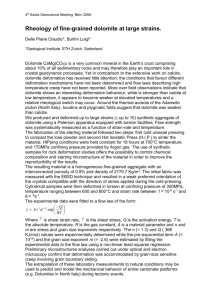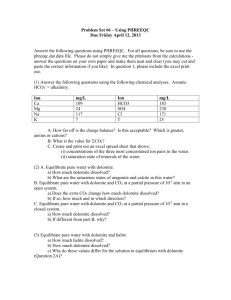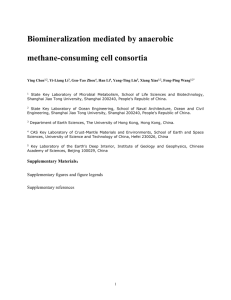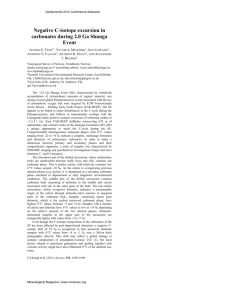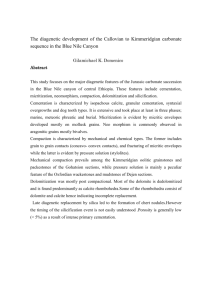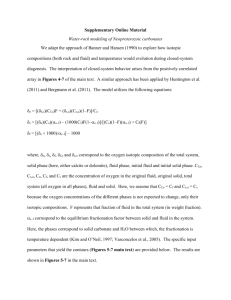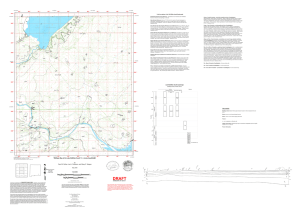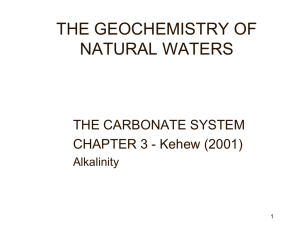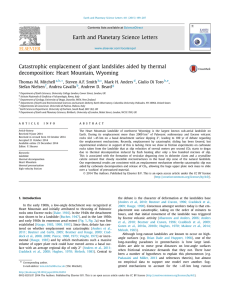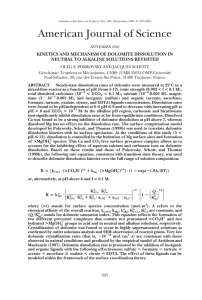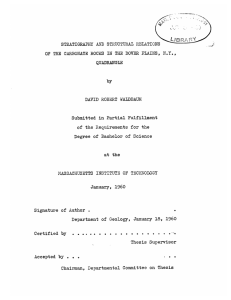Sulfate Anomalies in the Telese Hypothermal Spring, Italy
advertisement
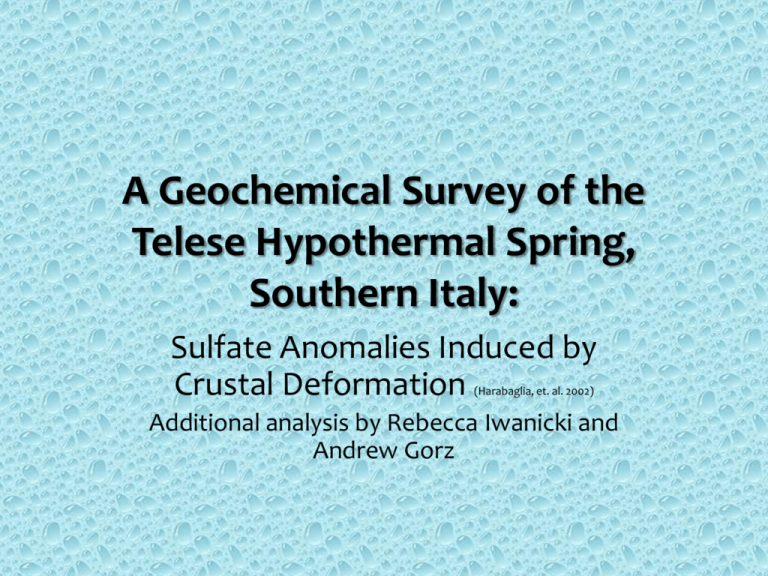
A Geochemical Survey of the Telese Hypothermal Spring, Southern Italy: Sulfate Anomalies Induced by Crustal Deformation (Harabaglia, et. al. 2002) Additional analysis by Rebecca Iwanicki and Andrew Gorz Geological Sketch of Telese and Surrounding Area 1 – Quaternary volcanics 2 – Neogene sediments 3 – Allochthonous Cretaceous-Oligocene flysch and Tertiary synorogenic clastic sediments 4 – Mesozoic carbonate Seismic Data Relevant Seismic data from summer 1998 to spring 1999 Precipitation Data Represents an unusually dry period with significance to conclusions Procedure and Process of Sampling •Monthly sampling of Telese Spring from April 1998 to April 1999 and conducted a geochemical survey. •Evaluated the influence of the seasonal cycle with respect to the shallower aquifer. •Is there a residual anomaly? Can natural conditions related to tectonic stress induce significant changes in the chemical content of thermal waters? •Used a portable pH meter for temperature, pH, and electrical conductivity. HCO3was also measured in the field by titration. •The water samples were filtered in the lab then the anions and cations were determined using an ion chromatograph. The total dissolved solids (TDS) were also determined. •Used the speciation program PHREEQC to determine the saturation indices for a variety of minerals as well as the logarithmic values of various ion activities which were then graphed. •Graphed the evolution of the SI values in relation to the SO42- concentration values. RESULTS • The relative concentrations of the major ions show the sample is of the calcium bicarbonate type and the water is derived from carbonatehosted aquifers • No significant fluctuations in temperature, pH, electrical conductivity, or TDS. • Constant concentration of all major ions except SO42- which drops notably in June 1998 and particularly from November 1998 to January 1999. F- behaved similarly suggesting it has a similar origin. •Oversaturated in calcite and dolomite with peak values between June and August 1998 due to decreased recharge flow in the dry season. The ratio of the activities of Mg+ to Ca2+ was quite constant which verifies the saturation state of dolomite. RESULTS • SO42- vs. Ca2+ showed a broad negative trend so calcite precipitation occurs due to added Ca in the dissolution of gypsum. Dolomite dissolution likely occurs as well because the increase in SO42- is accompanied by an increase in the Mg/Ca ratio. • Undersaturation of gypsum and fluorite. • Evidence provided by the saturation indices, the SO42- concentrations, and the Mg/Ca activity ratios show that the groundwater is likely rising from a carbonate aquifer. These values could also be largely affected by the dissolution of gypsum. RESULTS • All water samples fall into the kaolinite field so significant addition of alkali’s via silicate dissolution can be disregarded. • Soils have a much higher CO2 partial pressure than the atmosphere so when rainwater percolates through its dissolving power is greatly enhanced. In the summer of 1998, there was lower replenishment of CO2 so the SI values for calcite and dolomite increased. Summary of Article • The thermal spring water is of the calcium bicarbonate type. • Temperature, pH, conductivity, TDS, and major chemistry stayed relatively constant. • The samples are saturated or oversaturated with respect to calcite and dolomite. • There was reduction in the supply of CO2 to the buried aquifer in the drier summer months causing a rise in SI values. • The precipitation of calcite and dissolution of dolomite and gypsum are the major processes controlling ion concentrations during the water-rock interaction. • The decrease in SO42- from December 1998-January 1999 can be attributed to a drop in the H2S supply from a deep-seated source caused by a temporary change in the stress regime. • Crustal permeability dropped at the end of a seismic swarm so that the sulfate content changed as well. OUR FINDINGS We looked to test a couple of their hypotheses that they left untested such as: • There was lowered carbon dioxide replenishment to the buried aquifer in the summer months. • The sulfate ion decrease in the wet months was due to a drop in the hydrogen sulfide supply from a deep seated source. CARBON DIOXIDE There was a decrease in precipitation in the summer months (4,5, and 6) which correlates to a decrease in the concentration of carbon dioxide in the buried aquifer. This corresponded to the increased SI values relative to calcite and dolomite. Molality of CO2 (mol/kg) CO2 (mol/kg) 0.06 0.05 0.04 0.03 0.02 0.01 0 1 2 3 4 5 6 7 8 Sample # 9 10 11 12 13 Mole Transfer of H2S 2.00E-02 11/19/1998 1.00E-02 4/30/1998 6/30/1998 7/30/1998 10/29/1998 4/20/1999 0.00E+00 1/8/1999 Mole Transfer 5/23/1998 -1.00E-02 8/27/1998 2/15/1999 -2.00E-02 -3.00E-02 -4.00E-02 9/18/1998 10/9/1998 References • • • • • • • Harabaglia, P., Mongelli, G., & Paternoster, M. (2002, September). A Geochemical Survey of the Telese Hypothermal Spring, Southern Italy: Sulfate Anomalies Induced by Crustal Deformation. Environmental Geosciences, 9(3), 89-101. Retrieved November 18, 2008, doi:10.1046/j.1526-0984.2002.93003.x gwydir.demon.co.uk/jo/minerals/gypsum.htm www.beg.utexas.edu/.../graphics/calcite.htm www.geo.umn.edu/.../1001/minerals/dolomite.shtml www.alibaba.com/countrysearch/IT/Italy.html http://commons.wikimedia.org/wiki/Image:Hydrogen-sulfide-elpot-transparent3D-balls.png http://commons.wikimedia.org/wiki/Image:Carbon-dioxide-3D-vdW.png Questions?
